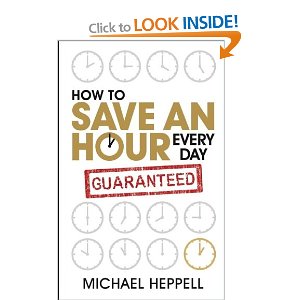A Little on Heppell and His Style
Michael Heppell is quickly becoming one of my favorite non-fiction authors. I’ve also read and loved The Edge and How to Be Brilliant.
His language is fun, catchy and he doesn’t waste words. He knows you don’t have all the time in the world, and appreciates that.
Heppell’s books successfully refute any excuse you might have about improving any area of your life by providing real life examples both from his life, and lives of his clients (he’s a personal development expert that works with companies and individuals) and readers. He also gives examples from real life success stories of people we are familiar with. He renders it impossible to say it’s not in your hands.
How To Save An Hour Every Day

How often do you wish every day had more hours? I know I have. Forget 25, I wouldn’t mind 250. But even though we can’t make days longer, we can feel like we have more time by making an hour available for an activity or task of our liking. We can achieve this by managing our time better.
How To Save an Hour Every Day was born out of Heppell’s own need for a good time management resource. However, what was available wasn’t simple, applicable and practical enough. So he delved into his own experiences, tips of his readers and clients, and hence created a book that is fun to read, and possible to apply – regardless of your marital status/lifestyle/job hours….etc.
We can see Heppell’s tips work when we look at his CV, popularity and number of bestsellers. But to get the best idea (and results), I strongly recommend the buying the book, reading it, keeping it as a reference and really applying stuff without trying to cheat.
The book covers:
– Creating a strong enough why: This chapter explains why you won’t take action unless you feel obligated, and how you can feel obligated.
– Overcoming procrastination I don’t need to explain this one. 🙂
– To Do or Not To Do, that’s the question: This section covers the problem with to-do lists, a very lucrative idea, priotizing and how to create not-to-do lists. I can’t stress the importance of the not-to-do lists enough.
– Dealing with distractions: Freelancers and office employees might deal with different distractions, but both have a lot of them. Luckily, Heppell comes up with beneficial tips on how to take care of them.
– Home: This part is about how to optimize the time we spend at home – and how we (should) spend it with the people at home. This doesn’t just cover quality family time, but also booking holidays, managing your finances, technology, exercise and more. Needless to say, this is one of my favorite chapters, though I love the book as a whole.
– Work: This is especially awesome for people with full-time jobs – complete with co-workers and bosses. It features tips on making meetings more efficient, optimizing your working hours and job description, emails and more. Freelancers can of course apply most of the tips about delegation, meetings, people that take too much off your time…and more.
– Advanced techniques: There’re some more concentration-requiring techniques, including using your voice to command technology, increasing your reading speed and more.
– Twenty-five extra ideas: These are the working ideas contributed by Heppell’s clients and readers. Take what applies, adapt and make them your own.
*
I recommend How to Save An Hour Every Day to everyone who wishes they had more time on their hands, but feels frustrated and stuck about the how.
Procrastination and distractions are universal problems, though as freelancers we probably need to deal with them even more regularly as we are our own bosses, and we are the ones responsible for all our working and free time.
You might think you have heard it all before, though I’m pretty sure you didn’t think of all of what’s suggested here, or at least you haven’t tried all the tips that might work. After all, you still have problems or at least desire improvements in this area, right?
Whatever you need more time for, this book gives you ideas to enable you to lead a more fun, productive and satisfactory life. Oh, and you could probably finish the book in an hour, especially if you’re good at speed reading.:)
More Useful Posts on Productivity and Time Management
Procrastination: Friend or Foe?
9 Productive Things Writers Can Do When They Have a Cold
How to Use Our Email Accounts Productively to Avoid Procrastination
Productivity for Writers: Tips to Increase Your Productivity During Hot Weather